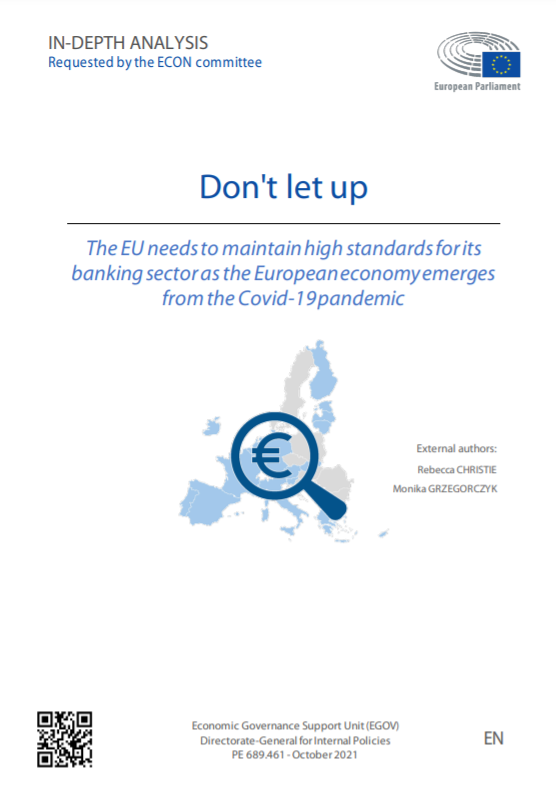Blog Post
Economic recovery after COVID-19 requires a clear vision for a healthy banking sector
The EU framework for crisis management and state aid in the banking sector urgently needs updating.
The end of payment holidays and the winding-down of public support schemes in the post-COVID-19 recovery will expose large stocks of non-performing loans (NPLs). European Central Bank estimates, based on earlier stress tests, suggest that in a severe but plausible scenario, NPLs at euro-area banks could reach €1.4 trillion, well above the last peak of around €1 trillion, or 7.4% of loans, in 2015. The new peak will arrive in the context of long-running profitability problems in the sector, which have discouraged NPL provisioning and speedy recognition of NPL-related losses. Based on the experience of the last 10 years, it is clear that under-provisioning and lack of workout capacity within banks are bound to slow down the NPL resolution process. This could hold back a recovery that will require a continued expansion in credit, and its reallocation to companies whose business models will be rewarded in the post-COVID-19 economic recovery.
COVID-19-related NPLs are likely to differ from the distressed legacy assets of the 2008 financial crisis and the euro-area sovereign debt crisis. The share of corporate loans will be larger and, within this asset class, there are likely to be more ‘going concern’ rather than ‘gone concern’ companies: firms with viable business models, facing temporary payment difficulties as a result of the severe COVID-19-induced recession. For such firms, financial restructuring rather than foreclosure should be the preferred solution. A lengthy NPL workout process, however, may push many companies into the gone concern category, creating additional and unnecessary welfare losses.
To prevent such an outcome, both further reform of NPL resolution and a better framework for bank crisis management are needed.
On the former, the European Commission has just published its priorities. The ongoing legislative effort to expand secondary distressed loan markets where banks can sell NPLs is welcome. Promoting greater transparency on loan quality, or a more efficient market structure through transaction platforms, could indeed speed up NPL disposals. Secondary loan markets have made a substantial contribution to NPL disposals since the last financial crisis. In 2018 alone, banks from across the euro area sold or securitised around €150 billion of NPLs. But transaction data also shows that the shares of dedicated sales of SME portfolios, and of loans in the early stages of arrears (‘unlikely to pay’) have been miniscule. These are exactly the types of loans that will now need to be handled. The EU still lacks a deep and sufficiently skilled investor base for distressed loans. Loan servicers, which do most of the legwork for financial investors, are growing but do not so far have sufficient capacity or credibility to handle substantial volumes in the coming wave of NPLs. In any case, progress on reforming insolvency frameworks has been very uneven, and the Commission’s proposal on collateral enforcement remains stuck in the inter-institutional process.
Asset management companies (AMCs) that work across national banking systems could thus play a valuable role alongside market-based solutions by private investors, and should be a much more central focus in the Commission’s work than suggested by the Communication. There are four such AMCs within the euro area. On the whole, they have had a good track record of loan restructuring and value recovery. Well-designed and professionally managed AMCs can help speed up the recovery process and prevent unnecessary welfare losses. They would overcome the temporary problem of fire sales in depressed markets, prevent premature insolvencies and pool restructuring capacity within a single institution. They should be empowered to advance restructuring or loan sales for some well-defined asset types. New AMCs, as they are now contemplated (in Greece for example), should heed the best practice set out in the European Commission’s 2018 AMC Blueprint, including on suitable asset classes, valuation and the effective functioning of the AMC itself.
But in its proposal on transferring banks’ impaired assets the Commission has been held back by a disjointed implementation of the EU’s crisis management framework and its policy on state aid to banks. The Commission is also tasked with a review of both policies. But given the rapidly gathering surge in NPLs, and as the current temporary framework for state aid will expire next year, this review should be accelerated, and concluded well ahead of the currently envisaged date in 2023. This review should have three priorities.
Transparency in loan valuations
Speed is essential in financial restructuring of an as-yet viable company. To date, transfers of loans to AMCs that could undertake such restructuring have often been slowed down by disputes over loan valuation. The ‘real economic value’ of loans is determined by the European Commission and represents the upper limit of state aid in an impaired asset measure. Determining this value has often been time-consuming, and based on the work of external service providers. The Commission should adopt and publish transparent and predictable valuation methodologies that reflect plausible scenarios for different sectors and asset types in the post-COVID-19 recovery. This would also give banks and private investors a clear benchmark in valuing portfolios and contemplating alternative strategies.
Rethinking the depth and scope of bank restructuring
The EU’s resolution framework, the BRRD (the Bank Recovery and Resolution Directive, 2014/59/EU), essentially limits state support outside resolution to the case of a precautionary recapitalisation. Aid granted, whether through the purchase of impaired assets above market prices or other capital support, can only make up for future likely losses in an adverse scenario. This may require clarification in the evolving recovery, as many business models in the corporate sector remain under threat and the macroeconomic environment remains extraordinarily uncertain.
State aid to banks in any case must be subject to a restructuring plan, involving cost-cutting measures or the sale of what are deemed non-core activities (often these turned out to be foreign subsidiaries). In the past these plans, which must be approved by DG Competition, have had some success in restoring bank profitability. However, the existing process governing state aid for impaired asset measures is no longer fit for purpose, and the concept of a bank’s long-term viability must be updated. It is based on Commission communications from 2009 and 2013, which were born of the experience of banking nationalism and weak supervision that led to the last crisis. The origins of the current framework long preceded the strengthening of regulatory standards at EU level, the pooling of supervisory powers within the ECB, and the curtailing of too-big-to-fail banks under the new resolution regime.
A system-wide perspective should inform any future restructuring plans. The long-term viability of banks within an integrated banking market should be the overriding objective, on an equal footing with level playing field considerations. Addressing the structural profitability problem would recognise that the euro area remains overbanked, that the non-bank financial sector continues to expand in importance and that the low interest-rate environment is likely to persist for some time.
Implementation of this policy would need to encourage to a much greater extent bank mergers and liquidations of non-viable banks, based on harmonised national bank insolvency procedures (as proposed here). Such a policy would need to draw on the powers of the Commission to impose remedies for state aid, recognising that current problems are rooted in a real sector crisis, rather than bank risk management failures. But the supervisor should be involved to a much greater extent in the design and implementation of restructuring plans. In the case of the ECB this could utilise existing powers to review banks’ business models, and to set targets for NPL reduction. This could be complemented by more prescriptive guidance on banks’ other unprofitable non-core assets.
Burden sharing
In any restructuring scheme, state aid is sensibly minimised as equity owners and junior bondholders must contribute to the bank’s losses before any public funds are used. But the requirement to write down junior debt holders or forcibly convert debt to equity creates political obstacles to use new AMCs in the EU. Future state aid decisions will need to take into account that the imminent NPL surge originates from a shock to the real sector, and that the restructuring of an individual bank may have wider benefits for the borrowers whose loans are transferred.
The temporary state aid framework rightly invoked the concept of the ‘serious disturbance in the economy’ in the BRRD to exempt certain state support from the bail-in requirement. This application should be extended throughout the recovery, as banks’ COVID-19-related losses begin to materialise.
In the post-COVID-19 recovery specialised NPL investors and loan servicers can support banks’ NPL resolution efforts. This sector has expanded significantly over the past ten years, though, like many other sectors in the capital market union, it remains underdeveloped and fragmented.
EU countries may now also propose new or expanded AMCs that would complement private markets in the restructuring effort. Bank owners and junior bondholders should indeed be written down to the extent that losses ultimately materialise from NPLs that are removed from banks’ balance sheets. But the approval of individual bank restructuring plans should reflect the benefits that arise in the real sector from a speedy NPL work out. There now is an opportunity to support the emergence of a sounder and more integrated European banking sector at the same time.
Recommended citation:
Lehmann, A. and R. Martin (2020) ‘Economic recovery after COVID-19 requires a clear vision for a healthy banking sector’, Bruegel Blog, 16 December
Republishing and referencing
Bruegel considers itself a public good and takes no institutional standpoint. Anyone is free to republish and/or quote this post without prior consent. Please provide a full reference, clearly stating Bruegel and the relevant author as the source, and include a prominent hyperlink to the original post.



















